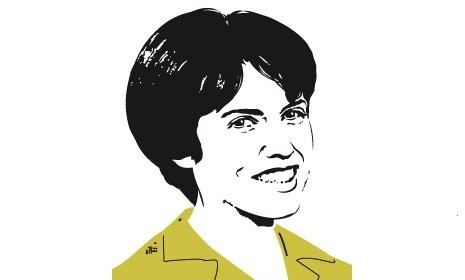What the heck happened to Hillary?
What has gotten into Hillary Clinton?

A free daily email with the biggest news stories of the day – and the best features from TheWeek.com
You are now subscribed
Your newsletter sign-up was successful
What has gotten into Hillary Clinton?
Since taking office on February 2, Clinton has gone from being one of the most guarded public figures in the history of hemming and hawing, to one of the straightest-talking secretaries of state imaginable. Over a few weeks and even more time zones, Clinton has not only told a number of hard truths, but told them in public and apparently on purpose.
In the Netherlands, on March 30, on the billions of U.S. aid dollars wasted in Afghanistan: “heartbreaking.”
The Week
Escape your echo chamber. Get the facts behind the news, plus analysis from multiple perspectives.

Sign up for The Week's Free Newsletters
From our morning news briefing to a weekly Good News Newsletter, get the best of The Week delivered directly to your inbox.
From our morning news briefing to a weekly Good News Newsletter, get the best of The Week delivered directly to your inbox.
In Mexico, on March 26, on America's war on drugs: "Clearly, what we have been doing has not worked.”
In South Korea, on February 19, on human rights in China: “Our pressing on those issues can't interfere with the global economic crisis, the global climate change crisis, and the security crisis."
Who is this woman and what has she done with the old Hillary?
When I covered her first race for the New York Senate in 2000 –the template for her later presidential bid -- the real Hillary was a fake Hillary, or rather, a Hillary who had long since had the authenticity drummed out of her by a relentless media beat. For years, she had been legitimately probed on matters such as Whitewater, cattle futures, and health care -- but also mercilessly punished for nothing at all. After making an off-the-cuff remark about preferring a career to staying at home baking cookies, she had to spend a decade swearing that she didn't hate homemakers. Every time she changed her hair, she was accused of trying to change her personality. For every Gennifer, Paula or Monica who surfaced, she had to . . . enough said. By the time Clinton ran for office, she was such a lightning rod that her whole mission was to avoid generating heat.
A free daily email with the biggest news stories of the day – and the best features from TheWeek.com
The result was a determined lack of substance that was shocking in a woman renowned for her command of policy. One example: In the course of her Senate campaign, she devoted speeches, sound bites, everything but sonnets to the notion that she had spent “more than thirty years” fighting for poor children. She devoted a total of less than two minutes, at the very end, to (sort of) addressing the impact of her husband's sweeping welfare reform on poor children. In her presidential race, the candor deficit owed less to Clinton saying nothing than to her apparent willingness to say anything. “In making different cases against Obama,” James Fallows observed in The Atlantic Monthly, “she reinforced the strongest argument against herself: that she would say whatever she thought might work at the moment.”
Becoming Secretary of State might have exaggerated these tendencies. The gutsiest marks Condoleeza Rice made were fashion statements, as when she wore those fab black knee-high boots to the army airfield in Wiesbaden, Germany. Colin Powell was ever circumspect – except for that time he carried water for the Bush administration on WMDs and destroyed his credibility.
Perhaps Clinton has been freed by speaking for an administration that is not her own, as well as an administration that expressly wants to break the mold. (It's easier to bemoan the waste of Afghan aid money when an unpopular predecessor has done the wasting.) Or perhaps it's because when she's on the world stage, she looks out at cheering audiences, secure in the knowledge that nobody thinks she killed Vince Foster. Whatever the reason, it seems as if Clinton has stopped holding her breath at last.
Of course, Clinton is hardly a source of candor all the time. Some of her highest-profile international appearances have been made on the celebrity softball field, such as Indonesia's version of MTV, or the Turkish equivalent of The View. And she can still break into fluent non-speak when she wants to. Besides, just because a statement is true does not mean it’s right. One can applaud the U.S. for honesty about its stance on human rights in China, and still decry the stance as wrong.
But for a position to be challenged, it has to be articulated in the first place. “Maybe this is unusual because you are supposed to be so careful that we spend hours avoiding stating the obvious,” Clinton said, explaining her acknowledgement, in February, that a thorny succession question was likely to flow from the stroke suffered in August by North Korean dictator Kim Jong-Il. “I think it’s worth, perhaps, being more straightforward, trying to engage other countries on the basis of the reality that exists.”
I still don’t know who this woman is or what she's done with the real Hillary. But, then again, I don’t care. This one can stay.